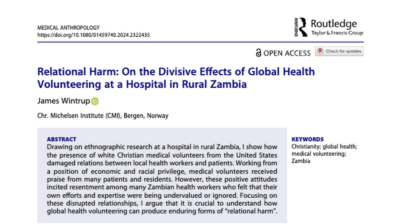When "participation" isn't participatory: current health reforms in colombia
Colombia is a country marked by extreme social inequalities and high levels of violence, with a government that has brutally repressed social movements and dissidents, including health workers’ unions. Notwithstanding the repression, various social sectors have gone to enormous lengths to denounce violations of the right to health produced in the current health system. These groups have proposed ways to overcome barriers to access and even alternatives to the present health system, which is based on a managed care system devised by technocrats in the early 1990s. Nevertheless, in this context, the Colombian Constitutional Court (the Court) has played an extraordinarily activist role — unparalleled in any other country in the world — in promoting greater economic and social rights and the rights of minorities, and in placing some restraints upon the executive branch.
In my Critical Concepts article in the forthcoming issue of Health and Human Rights, “Suffering and powerlessness: The significance of participation in rights-based approaches to health”, I refer in passing to a sweeping judgment by the Court in July 2008. This ruling, in taking seriously the enforceability of the right to health, called for the government to restructure that country’s health system. However, recognizing that it did not have the expertise or legitimacy to determine which treatments and services should be included in the social insurance scheme, the Court called for a broad participatory process to determine the content of a newly revised and unified benefits scheme. In a Perspectives piece in this issue, “Democratic deliberation or social marketing?” which is forthcoming in Spanish in a Colombian journal, my co-authors and I explore in much greater detail the degree to which the Colombian government has met the criteria for participation set out by the Court. We conclude in large measure that it has not and that, as a consequence, the reforms being put in place are at risk of not being accepted by the Colombian public. In turn, people may continue to flood the courts with lawsuits that undermine the financial sustainability of the system, although this is precisely the result that the Court’s structural judgment sought to avoid.
The case of Colombia puts into sharp relief the potential strengths and limitations of a court-initiated process of health reform that calls for — and indeed requires — meaningful participation in a context of relatively low social mobilization and a highly autocratic regime. Furthermore, it vividly illustrates both what is at stake in defining participation, and the risks of participatory processes that serve only to provide a patina of legitimacy to decisions taken beyond any public decision-making arena. We are flooded with new forms of “rights-based participatory mecha- nisms” all the time in public health — for example, “observatories,” “round-tables,” and “multi-sectorial committees.” Yet we must not uncritically accept these as advances in rights-based approaches to health lest rights-based approaches devolve into the same kinds of feeble, managerialist participation that have plagued health and development arenas for decades and do nothing to genuinely empower those who are most marginalized.



